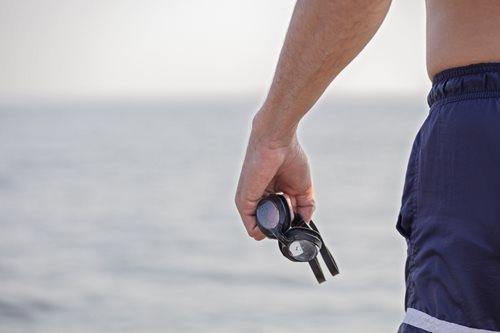September 13, 2017
By Keith Rohman
If you or someone you know is experiencing a mental health, suicide or substance use crisis or emotional distress, reach out 24/7 to the 988 Suicide and Crisis Lifeline (formerly known as the National Suicide Prevention Lifeline) by dialing or texting 988 or using chat services at 988lifeline.org to connect to a trained crisis counselor. You can also get crisis text support via the Crisis Text Line by texting NAMI to 741741.
It was a beautiful June morning when I leapt into the San Francisco Bay. Along with 800 swimmers from around the world, I was competing in the 2017 Sharkfest Swim from Alcatraz Island to San Francisco. I had tucked a laminated picture of my son Jack into my wetsuit. Jack suffered from schizophrenia, and eventually took his own life at age of 21. I swam in Jack’s memory and to raise money for NAMI.
San Francisco Bay has a notorious reputation for its cold water, treacherous currents and 14 species of sharks, including great whites. Movies and books have captured stories of prisoners trying to swim their way to freedom from the now-shuttered federal prison. But contrary to these tales, many competitive swimmers have completed the swim with the help of proper training, planning and a wetsuit. I hoped to be among them.
When Jack died in 2011, our family entered a long period of grief and mourning. Months went by in what felt like an unending grim march. While the grief continues to this day, somewhere in the second year after Jack’s death, I started to reenter life. I had always been a swimmer, and my therapist encouraged me to keep exercising as part of healing.

To motivate myself, I started working in the pool with a swim coach. Coach Stu was the person who first asked if I had ever considered open water swimming. A few months later I did my first one-mile swimming race in the Santa Monica Bay. I was hooked by the challenge, the excitement and the rush trying something new. I think of Jack every day, but taking on this new challenge helped me come back into the world—at least in part.
This was how I came to be standing in a wetsuit on a ferry anchored just east of Alcatraz on June 4, 2017, preparing to jump into 59-degree water. I was accompanied by my cousin Robin Forestier-Walker. Robin had suggested we do the Sharkfest Swim to raise money in Jack’s memory. I was hesitant at first to tie so much emotion to an already challenging athletic endeavor, but I’m glad we did; the fundraising was a remarkable experience.
We raised over $22,000 for NAMI from over 140 donors around the world. In fact, the swim became the largest ever “Do It Yourself” fundraising event in NAMI’s history. Along with thousands of dollars in donations came messages of support that filled my family’s heart, including from people who shared their experiences with mental illness and how they found help and hope through NAMI.
I finished the mile-and-a-half swim in 50 minutes—541 out of 830 swimmers. I’m 59-years-old, and almost every swimmer who finished after me was younger; that is all the bragging rights I need as a competitive swimmer.
But, as a father, I came out of the water and embraced my wife Connie and my daughter Nora, and I held up the photo of Jack. My family was together again, if only symbolically, in this moment of joy, exhaustion, and sadness. I wept for Jack and for the millions of others who live with a mental illness.
Several years ago, I wrote a poem about taking up open water swimming after Jack’s death. It talks about the challenges of swimming in cold water, the taste of seawater in my mouth, how I would ask myself, “Why am I doing this?” But then, as the poem says, I find the rhythm in my stroke, see the sun flashing off the water, and feel the joy of entering the water and reentering life after loss. The poem concludes,
I know there is only one way to get to this place.
You have to step off the land, and into the water.
In spite of everything.
Because of everything.
I have to step off the land, and into the water.
For more on Keith’s swim and to learn more about Jack’s life, visit https://donate.nami.org/HonoringJack
Submit To The NAMI Blog
We’re always accepting submissions to the NAMI Blog! We feature the latest research, stories of recovery, ways to end stigma and strategies for living well with mental illness. Most importantly: We feature your voices.
LEARN MORE